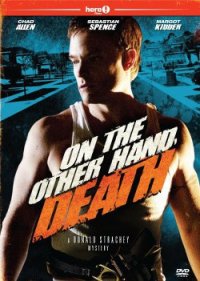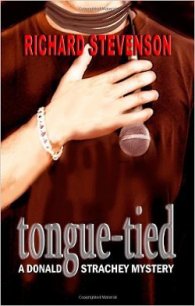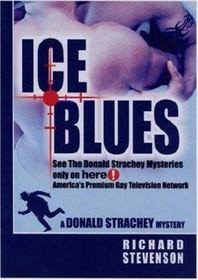Strachey's Folly - Stevenson Richard (читать книги онлайн регистрации .TXT) 📗
A silence. "Give me your number. I'll call you back."
I recited our hotel and room numbers and hung up. I said, "She's checking on Bittner with Terry and on us with Bittner."
I glanced through the Post—Bob Dole was threatening to take off the kid gloves in his second debate with Clinton—and Timmy checked the corridor again and then looked out the window for suspicious characters two stories below on Second Street, SE.
Within minutes Chondelle Dolan had called back and agreed to meet Timmy and me at a Pennsylvania Avenue bagel shop in half an hour. Meanwhile, I checked GW again to verify that Maynard was still stable. He was. With Timmy's concurrence, I went ahead and phoned a number in Tilton, Illinois, and reached, as I hoped I would, old Peace Corps ties aside, May-nard's brother. Neither Timmy nor I wanted to be the one to notify Maynard's parents, if we could avoid it. Edwin Sudbury said he would do that, and he said he and his wife would leave for Washington as soon as they could make travel arrangements.
"Was it a mugging?" Sudbury asked anxiously.
I said the motive for the attack had not yet been determined, but that given Washington's robbery rate, a mugging was what a lot of people seemed to suspect it might have been. Seated nearby, Timmy rolled his eyes.
"You got ID?" she said.
"Sure." I showed her my New York State PI license, and Timmy presented his card identifying him as the chief legislative aide to New York State assemblyman Myron Lipshutz.
"Bob Bittner says you guys have your idiosyncrasies but I hat you're responsible enough citizens, and I should take you seriously even if what you have to say might sound a little gonzo at first."
"That sums us up," I said.
Dolan looked at me with no hint of enthusiasm but with large dark eyes that were interested and alert. In her midthirties, she had a big, handsome Ibo face with the kind of sharply ridged, ample lips that I'd always found deeply erotic on black men and pleasing in a less hormonal way on black women. Dolan's shoulder-length hair, done in a near-flip, was black and gleaming, and her eye shadow was the same shade of cobalt blue as her two-piece silk suit and blouse. Had it not been for her bulky muscularity, she'd have looked less like a cop than a prosecuting attorney, or a regional administrator of the Department of Labor. She was both cool and formidable—I guessed that even in Marion Barry's age of racial payback in Washington, her rise through the police ranks had not been easy—and it looked as if we had lucked out in hooking up with Chondelle
Dolan.
Timmy fidgeted with his bagel and said, "Do you mind if we look at your ID, too, Ms. Dolan?"
"No problem," she said, and flipped open a black leather wallet so that we could examine her name and badge.
"Thanks," Timmy said. "We're nervous—I am, anyway— and -when you hear about all this grotesque stuff, I think you'll understand why."
"Uh-huh. Well, you go ahead and tell me your story. I've got plenty of time. I've got a lunch date at one, but till then I'm interested to hear what you got to say about this shooting you mentioned."
I began to speak, but Timmy's eyes darted quickly around the bagel shop at the other customers, and he cut me off with, "You used to date Rain Terry? I just met her a few times and she seemed awfully nice."
"Yeah, Rain's a peach." Dolan picked up on Timmy's antsi-ness and leaned closer and lowered her voice. "Rain's got two kids now with her partner—two little boys. Did you know that?"
"No, I didn't," Timmy said.
"That's not for me," Dolan said in a matter-of-fact way. "I got nine brothers and sisters, seven of them younger than me. Somebody else wants to overpopulate the world, fine. Me? Uh-uh."
"I'm the father of a child in Edensburg, New York, north of Albany," Timmy said, and with an accustomed gesture whipped out his wallet. "Two lesbian friends asked me to be the father of their child—via artificial insemination, of course—and it turns out I love it. This is Erica Osborne-Kotlowitz."
Dolan glanced briefly at the photo of a tiny person in a white dress and said, "Looks human to me, Timothy. Good for you, honey."
"She'll be seventeen months old this Thursday," he said.
"Uh-huh."
I said, "Chondelle—may I call you Chondelle?"
"Yes, you may."
"Chondelle, to get to the point, a close friend of Timmy's was shot and seriously wounded in front of his house on E Street, Southeast, last night."
"Maynard Sudbury is his name," Timmy put in, leaning close to Dolan. "We were in the Peace Corps together in India in the midsixties. A poultry development project. Few of us had any real experience with farming of any kind. We were what the Peace Corps calls BAGs—B.A. generalists. The Peace Corps philosophy at that time was—"
"Timmy, Chondelle has a date in a couple of hours, so maybe we need to just explain to her what happened yesterday and last night and postpone the theories of rural development until a later date."
"Yeah," she said, "I'd love to hear about you and your friends raising chickens. But let's save that."
I looked around, and nobody was seated at the tables adjacent to ours, and none of the Sunday-morning coffee drinkers and Post readers in the shop showed any sign of being aware of us at all. I said, "Timmy is afraid that the shooting and a number of other disturbing events yesterday are interconnected—part of an extensive Robert Ludlum-style conspiracy. I don't agree, but his suspicions are not entirely off-the-wall. It was a pretty wild twelve hours yesterday." Then I laid it all out: the first un-expurgated version of Saturday's events spoken out loud by Timmy or me to anyone.
While Timmy shifted uneasily in his seat, I described to Dolan Maynard's shock at discovering an AIDS quilt panel for Jim Suter; the mysterious appearance at the panel by a woman Maynard recognized as former congresswoman Betty Krumfutz; the letter from Suter warning Maynard that Suter's life was in danger and the admonition not to reveal Suter's whereabouts to anyone, especially not to the D.C. cops or to any people on "the Hill"; the reported vandalism of the Suter panel on the quilt; the brutal shooting; the ransacking of Maynard's house while Timmy and I were at the hospital; the unnerving multiple appearances by D.C. police detective Ray Craig.
Dolan listened to this recitation carefully and with a look of concern and growing distaste. When I mentioned Suter's warning not to reveal any of this story to the D.C. cops, Dolan raised a carefully drawn eyebrow but did not react otherwise.
When I had finished, she said, "I'm sorry about your friend. I hope he makes it. Firearms do terrible damage to human bodies, but at GW they deal with these injuries all the time. So he's in good hands."
"And Maynard's resilient," Timmy said. "He's survived things almost as bad as getting shot—parasites, plagues, guerrilla wars, mobs, you name it. So there's reason to hope he can withstand this attack, too."
"Maynard sounds like a real tough bird."
"So, what do you think?" Timmy said. "Am I crazy, or is there really something big going on here? Something . . . something interrelated with . . . with a lot of people involved in it?" He took a quick look over his shoulder, as if he might catch another patron of the coffee shop in the act of pointing a directional microphone our way, or aiming a bamboo pipe with a poisoned blow dart.




